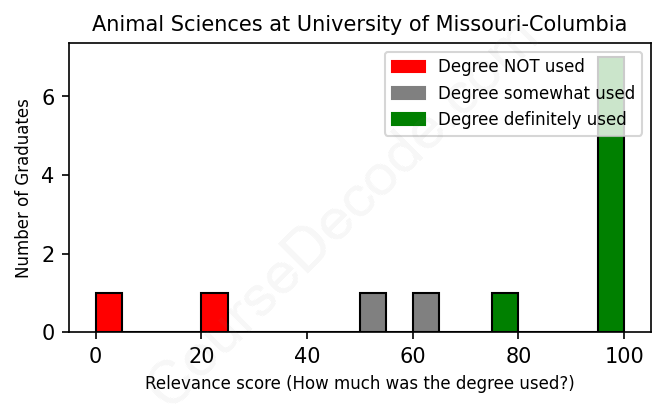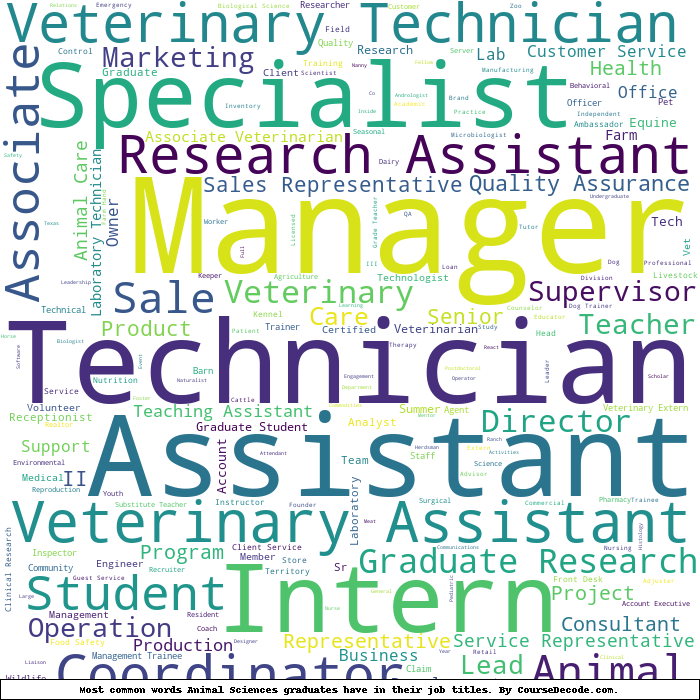
First, some facts. Of the Animal Sciences graduates from University of Missouri-Columbia we've analyzed , here's how many have used (or NOT used) their degree in their career:

These are estimates based on AI analysis of 12 LinkedIn profiles (see below).
The verdict? Above average. Overall, with an average relevance score of 75%, Animal Sciences graduates from University of Missouri-Columbia have a higher likelihood (+8%) of finding work in this field compared to the average graduate across all fields:
And for comparison, here's the chart for all profiles we've looked at across all degrees.
Also, after graduating, only 25% of these graduates have pursued further education other than another Bachelor's degree (such as a Masters degree or other), compared to the average across all profiles of 35%. This suggests a Bachelors degree is enough for most Animal Sciences graduates, and it's normal to look for work straight after graduation.
See the details:
|
Relevance score: 77% We think this person has gone into a career highly relevant to their degree. We think this person has gone into a career highly relevant to their degree.
DEGREE INFOGraduated in 2012 from University of Missouri-Columbia with a Bachelor of Science - BS in Animal Sciences. No other secondary education since. JOB HISTORY SINCE GRADUATIONAssistant Yearling Manager at Lane's End/Oak Tree Lane's End Farm Dec 2012 - Sep 2017 Assistant Manager  Mallory Farm of Kentucky Sep 2017 - May 2019 Administrative Assistant to Dr. Scott Hopper & Dr. Brad Tanner  Rood and Riddle Equine Hospital May 2019 - Present ABOUTI graduated from the University of Missouri-Columbia in 2012 with a BS in Animal Science in addition to an English minor. Post graduation I was accepted into the Kentucky Equine Management Internship and I've been working in the Thoroughbred industry since. The first five years I was an assistant yearling manager at Lane's End/Oak Tree Division and from 2017-2019 I was the assistant manager at Mallory Farm of Kentucky. My current position is at Rood and Riddle Equine Hospital as an administrative assistant to Dr. Scott Hopper and Dr. Brad Tanner. I've had a very well rounded experience beyond typical farm work and equine care as I've learned to manage employees, delegate, and time manage appropriately. I've also performed office duties such as filing, client communication, billing, answering phones and arranging transportation. |
The top 10 most common jobs done by the graduates we've analyzed (ranked most common to least) are:
When looking at the career paths of people who graduated with a degree in Animal Sciences from the University of Missouri-Columbia, you’ll notice a noticeable tendency towards jobs that are heavily linked to animal care and management. Many graduates end up in positions such as Veterinary Technicians, Animal Technicians, and various managerial roles in kennel and farm settings, where their education in animal behavior, welfare, and health is put to good use. These roles typically involve direct interaction with animals and require a solid grounding in the principles learned throughout their degree program. For example, positions like Veterinary Assistant or Emergency Veterinary Assistant clearly utilize their skills in practical, hands-on ways.
On the flip side, not all graduates stick to animal-related careers. Some have ventured into jobs like Administrative Assistant, Billing Manager, or Sales Consultant, which don't draw directly from their Animal Sciences education. These roles show that while the degree provides a strong foundation in animal science, it doesn't always translate to a job in the field. Overall, the majority of the roles are quite relevant, especially those involving direct animal care or scientific research, but there's also a clear trend of graduates finding their way into various unrelated fields. It’s a mixed bag, which is pretty common across many degrees!
Here is a visual representation of the most common words in job titles for Animal Sciences graduates (this is across all Animal Sciences graduates we've analyzed, not just those who went to University of Missouri-Columbia):

Based on the data from LinkedIn profiles, it looks like graduates from the University of Missouri-Columbia with a degree in Animal Sciences are taking on a variety of roles right after they leave college. Many of them start out in positions that still keep them close to animals, like veterinary assistants, animal technicians, or even management roles at kennels or farms. Some early career paths lead directly into veterinary medicine or research, while others might drift into areas like pharmacy or administrative roles in related fields. So, it's fair to say that many guys here seem to land jobs that connect with their degrees pretty well, at least initially.
Looking a bit further down the line, around five to ten years later, several graduates appear to have solidified their careers in animal-related industries. Some have moved up to managerial roles in animal care facilities or transitioned to research and education positions, reflecting a good degree of growth in their fields. However, there are also a few who seem to veer off into unrelated careers that don’t quite align with their studies. This variety suggests that while many find fulfilling careers in animal sciences, others might end up taking paths that are less predictable and not as closely related to what they studied. Overall, though, it seems that a good chunk of these graduates are on a decent trajectory within animal sciences.
Getting a Bachelor’s degree in Animal Sciences at the University of Missouri-Columbia, or really anywhere, can be a mix of challenging and manageable, depending on your interests and study habits. If you love animals and biology, you might find it super engaging and easier to handle, while others might struggle with the more technical aspects like genetics or nutrition. You’ll have to juggle a good amount of lab work, field studies, and coursework on top of your regular classes, which can be a lot at times. Overall, I’d say it’s about average in terms of difficulty—you’ll definitely have to put in the work, but if you're passionate about the subject, it can be really rewarding!
Most commonly, in the LinkedIn profiles we've looked at, it takes people 4 years to finish a Bachelor degree in Animal Sciences.
So, looking at these Animal Sciences grads from the University of Missouri-Columbia, it seems like they're mostly carving out pretty decent careers, but it really varies. Some, like the ones working at research centers or as managers at kennels, are likely pulling in good salaries—especially with their experience and those managerial roles. On the flip side, jobs like veterinary assistant or receptionist don’t usually pay as well, so those folks might not be making bank right off the bat. Overall, it seems like some are on a solid track for financial stability, while others could be feeling the pinch a bit, especially while they're still climbing the career ladder. So, it’s a mixed bag!
Here is a visual representation of the most common words seen in the "about" section of LinkedIn profiles who have a Bachelor degree in Animal Sciences (this is across all Animal Sciences graduates we've analyzed, not just those who went to University of Missouri-Columbia). This may or may not be useful:

Here are all colleges offering a Bachelor degree in Animal Sciences (ordered by the average relevance score of their Animal Sciences graduates, best to worst) where we have analyzed at least 10 of their graduates:
| College | Score | Count |
|---|---|---|
 Purdue University Purdue University
|
80 | 14 |
 California State Polytechnic University-Pomona California State Polytechnic University-Pomona
|
78 | 13 |
 North Carolina State University North Carolina State University
|
77 | 18 |
 Iowa State University Iowa State University
|
75 | 25 |
 University of Missouri-Columbia University of Missouri-Columbia
|
75 | 12 |
 South Dakota State University South Dakota State University
|
73 | 10 |
 The Ohio State University The Ohio State University
|
71 | 21 |
 University of Florida University of Florida
|
68 | 15 |
 University of Vermont University of Vermont
|
68 | 12 |
 Michigan State University Michigan State University
|
67 | 20 |
 University of California, Davis University of California, Davis
|
66 | 27 |
 University of Illinois at Urbana-Champaign University of Illinois at Urbana-Champaign
|
63 | 16 |
 University of Tennessee, Knoxville University of Tennessee, Knoxville
|
61 | 13 |
 University of Arkansas University of Arkansas
|
60 | 10 |
 California Polytechnic State University-San Luis Obispo California Polytechnic State University-San Luis Obispo
|
59 | 22 |
 University of Wisconsin-River Falls University of Wisconsin-River Falls
|
58 | 10 |
 Texas A&M University Texas A&M University
|
54 | 34 |
 Penn State University Penn State University
|
53 | 14 |
 Texas Tech University Texas Tech University
|
51 | 12 |
 Kansas State University Kansas State University
|
51 | 22 |
 Oklahoma State University Oklahoma State University
|
43 | 16 |